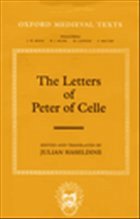Peter of Celle, abbot of the great Benedictine houses of Montier-la-Celle (c.1145-62) and Saint-Remi, Reims (1162-81), and bishop of Chartres (1181-3), was a figure of considerable authority and influence in twelfth-century France. Close to the royal family and to the court of Champagne, a friend of John of Salisbury and a supporter of Thomas Becket, known to Saint Bernard and to Peter the Venerable, his connections were impressive. In his letters, however, it is the concerns and ideals of the monastic world which are to the fore. At a time of unprecedented upheaval in western religious life, Peter's circle embraced many members of the new orders, Cistercians, Carthusians, and Grandmontines among them. His letters form an eloquent testimony to the power of friendship and co-operation at a time of frequent tension and rivalry. They offer a unique insight into the ideals and values of the monastic world, through the strong voice and critical eye of one of its leading proponents, at a crucial turning point for western religion.
Review quote:
This splendid new edition opens up a segment of the Benedictine world at a point when it was most cosmopolitan ... Julian Haseldine's lucid translations enable us to follow the complex interlacing of biblical image and metaphor which gives Peter's prose a luxuriant richness.
Peter of Celle was a figure of great authority and influence in twelfth-century France. His letters offer a unique insight into the ideals and values of the monastic world at a critical turning point for western religion. This is the first translation of his correspondence and the first complete modern edition, with full scholarly apparatus and a historical introduction.
Review quote:
This splendid new edition opens up a segment of the Benedictine world at a point when it was most cosmopolitan ... Julian Haseldine's lucid translations enable us to follow the complex interlacing of biblical image and metaphor which gives Peter's prose a luxuriant richness.
Peter of Celle was a figure of great authority and influence in twelfth-century France. His letters offer a unique insight into the ideals and values of the monastic world at a critical turning point for western religion. This is the first translation of his correspondence and the first complete modern edition, with full scholarly apparatus and a historical introduction.

